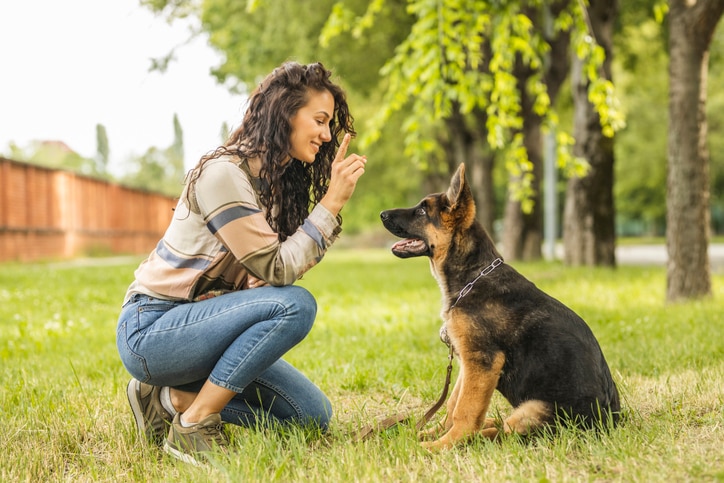How To Train a German Shepherd Puppy

Photo by Eleganza / iStock / Getty Images Plus
German Shepherd dogs were originally bred to herd sheep and protect the flock from predators—hence the name. They’re incredibly intelligent dogs, and that can make training a challenge. But it’s well worth the effort to have one of these loyal, hardworking pups by your side.
Understanding Your German Shepherd’s Temperament
Your German Shepherd’s temperament is the result of both genetic and environmental influences. While instinct drives some of their behaviors, socialization is crucial to raising a well-adjusted dog.
Introduce your puppy to other dogs, people, and to being in other environments from 3–12 weeks of age. Exposure to new people, animals, and experiences will help your puppy mature into a confident, well-behaved dog.
Well-socialized German Shepherd puppies may be more curious and capable of learning how to perform complex tasks. This is important if the pet parent wants their dog to participate in dog sports, or engage in difficult work such as search and rescue.
Dogs learn through forming associations. For example, if you bend over and pet your puppy when they jump up on you, your puppy will learn to jump on people to get attention.
German Shepherds are known to have high drive and energy. Without training, socialization, and consistent guidance from the pet parent, a German Shepherd will mature into a medium- to large-size dog who can pull hard on the leash; jump up and knock down the pet parents or other people upon meeting them; and chew up items around the house or in the yard. It is never too early to start training a German Shepherd puppy.
While German Shepherd dogs can be great family dogs, they may retain a certain degree of coolness or indifference toward people they meet for the first time. Allowing puppies to interact with other people can build up positive associations, reduce their fears, and help them accept strangers.
Are German Shepherd Puppies Easy To Train?
German Shepherd puppies are generally easy to train, compared to some other breeds. German Shepherds are intelligent, hardworking dogs who like to please their pet parents. The key to training is finding the right motivator for the puppy, whether it is treats, praise, toys, play time, or affection from the pet parents.
Essential Training Tools and Equipment
- Dog collar
- Dog harness
- Sturdy 6-foot leash
- Dog training clicker (optional)
A well-fitting collar, harness, and sturdy 6-foot-long leash are the basic equipment you need to get started. Additionally, some puppy parents may find the clicker is an easy tool to train their puppies. There is a small learning curve for pet parents to learn when to click and to teach their puppy that the click is a predictor of a reward to come. But once the puppy learns that the click occurs when they perform certain behaviors, they quickly catch on.
German Shepherd Puppy Training Timeline
Puppies can learn new behaviors as young as 5–6 weeks of age. By 8 weeks of age, most German Shepherd puppies have a near adult-like capacity to learn new behaviors. But no matter the age of your puppy, follow these tips:
- Use rewards that are motivating to the puppy, such as tasty treats, verbal praise, toys, or pets.
- Focus on teaching them one new behavior at a time in short 5–10-minute sessions. Puppies’ short attention spans are unlikely to last beyond that amount of time.
- Repeat sessions 3–5 times until they have learned the new behavior.
8–16 Weeks
- Socialization: During this period, puppies should be receiving exposure to the outside world at a minimum of two to three times a week. As long as puppies have received one DHPP vaccine, been dewormed, and are not showing signs of illness, they should be going to socialization classes in addition to training classes. Pet parents can also take their puppies out in puppy slings or strollers so they can experience the world.
- Crate training: Crates provide a place for pet parents to keep their puppies when they cannot supervise them for a certain period. In crate training, puppies learn that the crate provides a safe place to rest.
- Potty training: By 8 weeks of age, puppies have voluntary control of their bladder. This means they do not need to be stimulated by their mothers in order to urinate, so it’s time to begin potty training.
- Coming when called: Puppies as young as 5–6 weeks old can learn to come when called—an essential skill your dog should have throughout their lifetime.
- The “sit” cue: Between 5–8 weeks of age, a German Shepherd puppy can also learn how to sit.
3–9 Months
- Behavior cue training: Between 8–12 weeks of age, puppies should know various behavioral cues, such as come, sit, and lie down. You should also be working on crate training and teaching them to go to their bed. Puppies should be participating in group classes to sharpen their skill to focus on the pet parents in different environments with other distractions present, such as other people, dogs, and noises.
- Walking on leash: They should also be going out for daily loose leash walks by 3–5 months old, depending upon the neighborhood. People who live in a high-dog-traffic neighborhood should wait until their puppies are fully vaccinated before walking on public streets. If you live in a low-dog-traffic area and can avoid areas where other dogs have urinated and defecated, puppies as young as 3–5 months can be walked on the street.
9–24 Months
- Advanced skills: German Shepherds are happiest when they’re busy, so consider getting them involved in specialty classes, such as impulse control, nose work, or scent training.
- Practicing calm behavior: Around this age, some German Shepherds become more alert to noises coming from outside the house. They may bark at people and dogs walking past the property, and delivery people and visitors approaching the front door. The pet parents should spend extra time working with their dog to reinforce calm, desirable behavior when visitors come to the house, such as sending them to their beds to receive a reward when the door is open. Acknowledge the barking behavior, and then reinforce the dogs for not barking.
German Shepherd Puppy Training Tips
- Use positive reinforcement: Positive reinforcement training is the best method to use to train a dog to become confident, reliably listen, and perform their behavioral cues. In this training method, the dog performs a desired behavior and is immediately offered a high-value reward. If the dogs like the reward, they will want to repeat the behavior again to gain more rewards.
- Establish a routine: It is important to set up consistent routines to help reduce anxiety and provide stability to the puppy’s world. Predictability helps puppies learn what is expected of them. For example, if you ask your puppy to sit every time they are at the door, they’ll soon learn to sit in order for you to take them outside.
- Hire a dog trainer: Hiring a professional trainer can help your puppy progress through training at a quicker pace. However, pet parents still need to work with their puppy. Otherwise, the puppy only listens and responds reliably to the trainer and not to the pet parent.
- Be kind, patient, and consistent: Raising a puppy requires time, money, and effort. However, the investment you put into the new puppy will pay off when your German Shepherd grows into a confident, responsive, and well-adjusted dog who is a pleasant companion to have on your walks around town or long nature hikes.
FAQs About Training German Shepherd Puppies
Q: What is the best age to start training a German Shepherd puppy?
A: Pet parents can start training as soon as they bring their puppy home, which is usually around 6–8 weeks of age.
Q: What is the first thing to teach a German Shepherd puppy?
A: Socialization, crate training, potty training, and basic obedience cues—like “come” and “sit”—are good initial training goals for German Shepherd puppies.



